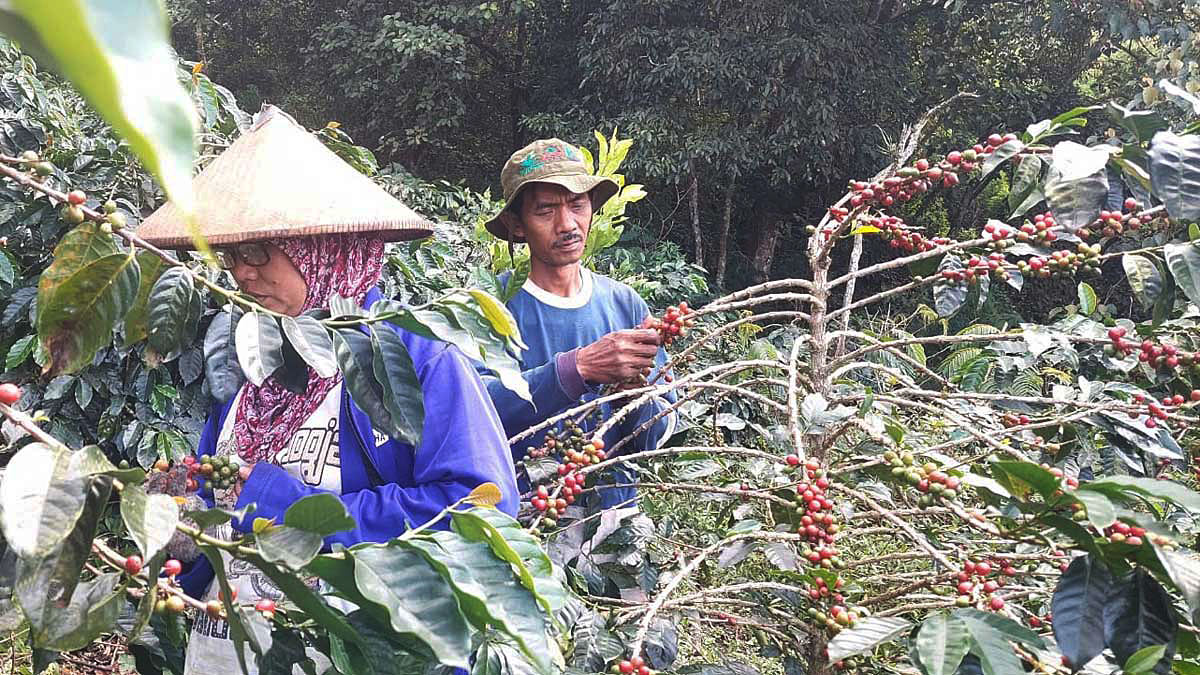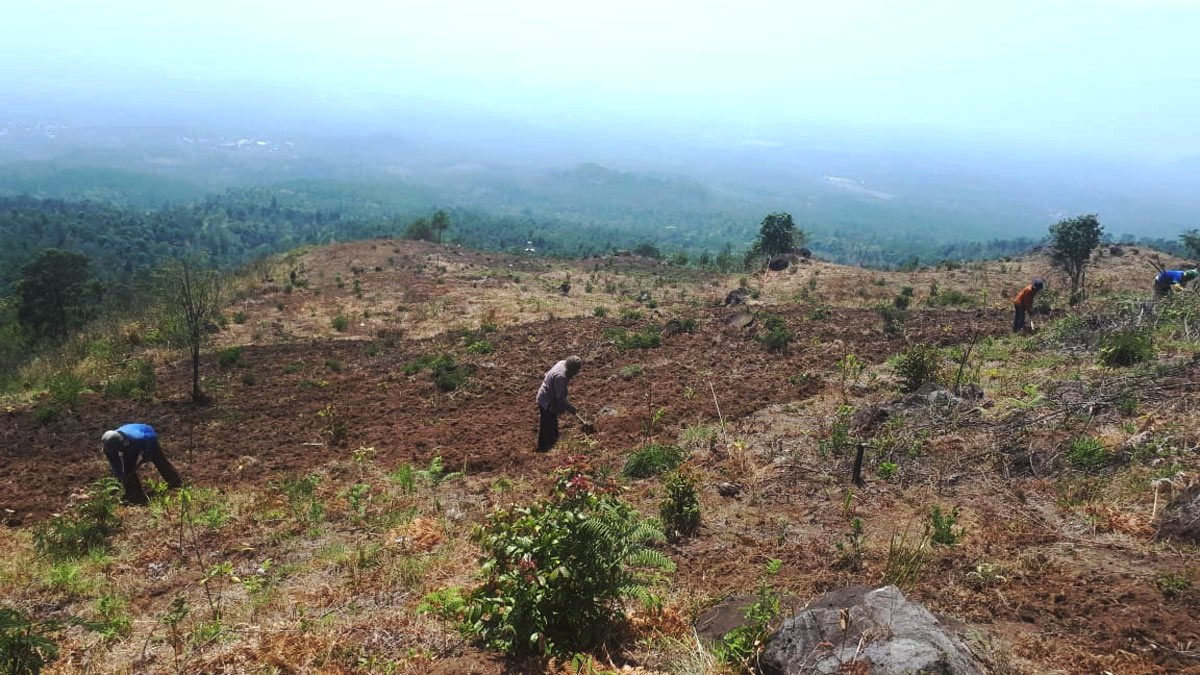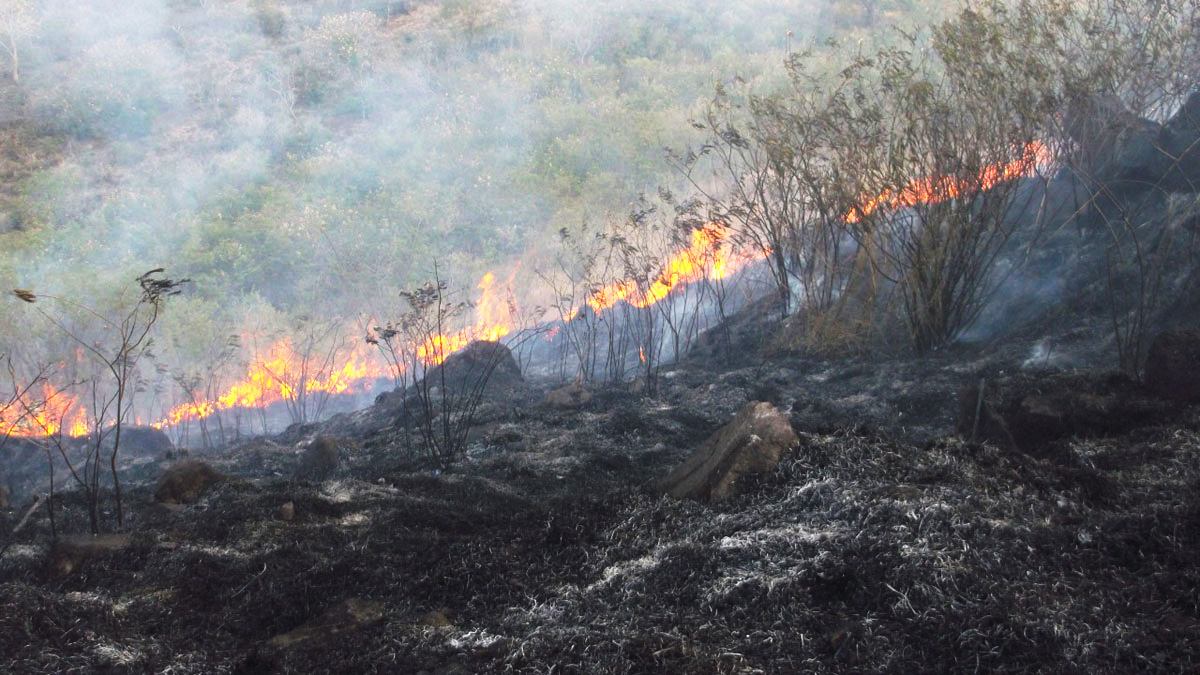A Thriving Forest Creates Economic Change
Monday, October 3, 2022
Farmers in social forests can work independently without assistance. They can now work state forests in peace.
arsip tempo : 174485573796.

THE social forest is regreening again the slopes of Mount Arjuno in Pasuruan, East Java. The area at 1,250 meters above sea level in the village of Jatiarjo caught fire and the land was burned to cinders in 2015. Sparks from a careless cigarette butt of a deer hunter had set ablaze community-owned nurseries in the vicinity. No less than 200 hectares of land caught fire.
Since 1998, people living in the surrounds of the Prigen subdistrict in Pasuruan had been encroaching into the production forest managed by Perum Perhutani. They changed the forest into agricultural plots. In time, the slopes became denuded. Illegal poachers who used fire to trap wild animals rendered the forest even more vulnerable.
When the forest fires finally abated, people in the area began to replant the slopes. This time, they decided to plant the land with fruit trees. They also nurtured secondary crops, like coffee. “We simply planted all and anything independently,” said Nurhidayat, a resident of Jatiarjo, on Friday, September 30.
In fact, the action of Nurhidayat and his fellow villagers were illegal. But political power post-Reformasi in 1998 resulted in many forest areas becoming openly accessible. Residents began to nurture plots in state-owned forests in droves by growing seasonal crops. Because these were illegal acts, they often had to play hide and seek with forest rangers and Perhutani monitors.
After the 2015 disaster, villagers living on the slopes of Arjuno realized their erroneous ways. They also heard rumors that forest encroachment would soon be legalized under a new plan called the social forestry scheme. In 2016, the government announced the social forestry program a national priority. Besides resolving social conflicts from forest encroachment, President Jokowi used the social forestry scheme as a method to alleviate poverty among destitute populations living around forests.

Coffee farmers of the Sumber Makmur Abadi Agroforestry Farmers Group on the slopes of Mount Arjuno in Pasuruan, East Java. Special Photo
Nurhidayat made preparations to register the plots he and his colleagues had been nurturing. A requirement to participate in the social forestry scheme was to have a farmers group. Some 20 neighbors came on board. They declared themselves the Sumber Makmur Abadi Agroforestry Farmers Group, or KTH. Nurhidayat, 43, was appointed the chair.
They registered 34 hectares of nursery on Lots 21 and 30. After two years of getting their administrative issues organized, the environment and forestry ministry (KLHK) granted the group a social forestry management permit, or IPHPS. This permit governs the category of social forestry within a Perhutani-owned vicinity with a forest cover less than 10 percent the area. If the forest cover they work remains pristine, it will use the forest partnership recognition and protection scheme (known as a kulin KK partnership) with Perhutani.
When they were finally issued the IPHPS, said Nurhidayat, trees they nurtured in plots that previously unscathed by the fires had already flourished well for having been planted in 2004. This was why the farming group could grow coffee, a tropical crop that grows well under in the shelter of the forest canopy.
Their coffee nursery totals 10 hectares. Each hectare boasts 1,000 trunks yielding arabica coffee beans. “Each tree yields 20 kilograms of green coffee beans,” said Nurhidayat. Green coffee beans from the Arjuno slopes fetches Rp100,000 per kilogram in local East Java markets. The Sumber Makmur farmers group now exports 1.2 tons of coffee annually to France, Switzerland, and China.
The farmers group organized all their matters independently, from obtaining the relevant permits to finding the markets for arabica coffee. They received no assistance from the social forestry office. Bearing this in mind, when the forestry ministry declared it would apply a scheme for lands under the special management forest areas, known as the KHDPK, Nurhidayat quickly put in an application for his group’s nursery plot.
Within the KHDPK scheme, the forestry ministry planned to discard 1.1 million hectares of Perhutani’s 2.4 million hectares of land. These are plots that in general are non-productive, are damaged protected forest area, or plots that have obtained the IPHPS or kulin KK status. Nurhidayat registered 1,000 hectares new area to be turned into a village forest. “This was a good way to quell conflict over land among locals here,” he said.
According to Nurhidayat, the social forestry scheme has allowed them to work state forest in peace. Prior to obtaining the IPHPS, they had often come to blows with Perhutani monitors. They now work their nurseries in peace and the farmers have proved to have increased their productivity. Their coffee crops alone now earn each farmer an income of Rp4 million per month.
In Cianjur, West Java, the Satria Mandiri and the Rindu Alam farmers groups also grow coffee on 87 hectares of Perhutani forest. The difference is the two groups obtained the assistance of the Prakarsa Hijau Indonesia (Green Initiative Indonesia) Foundation. Both farmers groups obtained their IPHPS permits in 2018. The coffee plants flourish under a canopy of fruit trees such as avocado, nira, and dog fruit (Archidendron pauciflorum).
According to Santoso from the Prakarsa Foundation, coffee alone provides 65 farmers from the two groups an income of Rp180 million each harvest, which usually occurs four times a year. They have labeled their Cianjur crop Sarongge Coffee, referring to the 1,535 meter high slope on the border of the Mount Gede Pangrango National Park. This year, the avocado harvest fetched Rp14 million, while dog fruit fetched Rp8 million. “For daily income, the farmers tap the sweet sap from nira trees,” said Santoso.
Despite the lands earning them income, Santoso pointed out that the Sarongge farmers as yet do not earn adequate income because harvests are so dependent on seasons. But under the social forestry scheme the farmers at least have stable income with certainty because their management over the land will last another 35 years. Pre-2018, farmers had to share their harvest yields with Perhutani. “Now we only give them a share if the harvest enjoys a profit,” he said.
Offering assistance, Santoso helps farmers establish their KTH group up to the point they find a market for their commodity crops. Sarongge Coffee is now exported to Hamburg, Germany, with a famous cafe being a permanent customer. While assisting the farmers group to get their permit papers in order for Perhutani and to market their commodities, Santoso charges no fee.

Forest fires on the slopes of Mount Arjuno Mountain in Pasuruan, East Java, in 2015. Special Photo
Coffee as the prima donna of the social forestry program does not only apply to Java. Farmers in the KTH Tanjung Lestari in Tanjung Agung village, South Ogan Komering Ulu, South Sumatra also grow coffee on their land within the forest. This KTH obtained a permit for a plot of 231 hectares. Besides coffee, the farmers also grow avocado, areca, cloves, and cinnamon.
Ahmad Zubaidi, chair of the KTH Tanjung Lestari, said since they obtained their permit, the individual farmers in the group have raised their income by 20 percent. This KTH received assistance from the Hutan Kita (Our Forest) Institute (Haki), an environmental community-based organization. They helped organize the crops, packaging, and marketing of Ranau Coffee, the brand name of coffee crops from Tanjung Agung. The name Ranau refers to the famed Ranau Lake in South Ogan Komering Ulu. “We do everything ourselves,” said Zubaidi
Since the location of their land is close to Ranau Lake, Zubaidi once encouraged other farmers to develop an ecotourism. But the overwhelming works on the social forestry plantation have forced them to put the plan on hold.
More stories:
- Social Forestry's Illegal Fees
- Corporate Hand on Social Forestry Program
- Social Forest Free Riders
- Interview Director General Social Forestry Ministry of Environment
Other social forestry programs that have proven economically viable include the community nursery forest in the Muara Burnai II village, Ogan Komering Ilir. The Farmers Groups Association of Sialang Makmur have been working 270 hectares of production forest since 2018. They mainly plant rubber trees. “On average the farmers earn Rp3.2 million per month per hectare,” said Gunawan, chair of the association.
Each farmer on average works a two-hectare plot. Muara Burnai residents are in general transmigrants from Java who previously encroached on Inhutani’s oil palm concession. However, because oil palm is banned from social forests, the community replaced the commodity with rubber.
When they first moved on Inhutani concession in 1997, the farmers divided the land into plots of six hectares on average. After the social forestry program, they were willing to reduce it to a maximum of two hectares for each family. The rubber sap yield today is purchased by the Shamrock Manufacturing Company at Rp29,000 per kilogram. “Praise God, the presence of an off-taker keeps the price stable,” said Gunawan.
This report is a collaborative work of Auriga Nusantara, Greenpeace Indonesia, Forest Watch Indonesia, and Hutan Kita Institute, Jaringan Pemantau Independen Kehutanan, Wahana Lingkungan Hidup Indonesia, Eyes on the Forest, Anti-Illegal Logging Institute, Perkumpulan Elang, Kelompok Advokasi Riau with the support of the Rainforest Investigations Network Pulitzer Center











